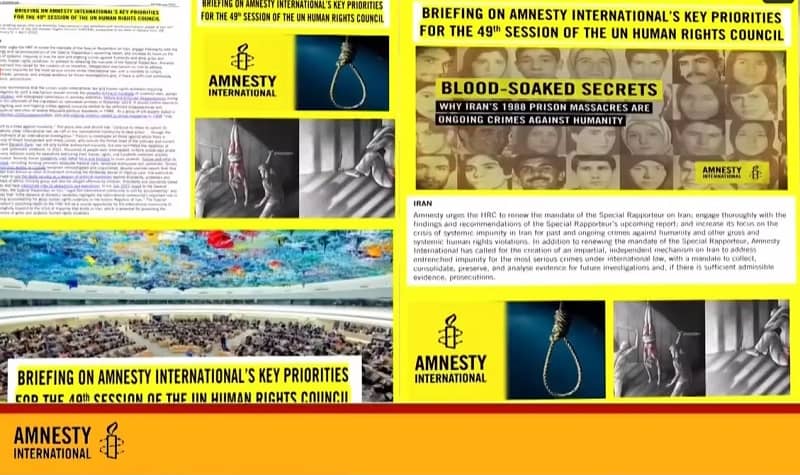
On the eve of the Human Rights Council meeting to be held in Geneva from February 28, 2022 to April 11, 2022, Amnesty International submitted a report to the Council and called for decisive action to prevent the continuation of gross human rights violations in Iran.
Amnesty International says in the report, Failure to investigate all those against whom there is evidence of direct involvement with these crimes, which include the former head of the judiciary and current president Ebrahim Raisi, has not only further entrenched impunity, but also facilitated the repetition of gross and systematic violations.
The text of this report in the section on human rights violations in Iran is as follows:
Amnesty urges the HRC to renew the mandate of the Special Rapporteur on Iran; engage thoroughly with the findings and recommendations of the Special Rapporteur’s upcoming report; and increase its focus on the crisis of systemic impunity in Iran for past and ongoing crimes against humanity and other gross and systemic human rights violations.
In addition to renewing the mandate of the Special Rapporteur, Amnesty International has called for the creation of an impartial, independent mechanism on Iran to address
entrenched impunity for the most serious crimes under international law, with a mandate to collect, consolidate, preserve, and analyse evidence for future investigations and, if there is sufficient admissible evidence, prosecutions.
Amnesty recommends that the crimes under international law and human rights violations requiring investigation by such a mechanism should include the unlawful killing of hundreds of unarmed men, women and children, and widespread commission of arbitrary detention, torture and enforced disappearances during and in the aftermath of the crackdown on nationwide protests in November 2019.
It should further extend to investigating past and ongoing crimes against humanity related to the enforced disappearances and extrajudicial execution of several thousand political dissidents in 1988.
As a group of UN experts stated in a September 2020 communication, past and ongoing violation related to prison massacres in 1988 “may amount to crimes against humanity.”
The group also said should Iran “continue to refuse to uphold its
obligations under international law, we call on the international community to take action … through the establishment of an international investigation.”
Failure to investigate all those against whom there is evidence of direct involvement with these crimes, who include the former head of the judiciary and current president Ebrahim Raisi, has not only further entrenched impunity, but also facilitated the repetition of
gross and systematic violations.
In 2021, thousands of people were interrogated, unfairly prosecuted and/or
arbitrarily detained solely for peacefully exercising their human rights, and hundreds remained unjustly imprisoned.
Security forces unlawfully used lethal force and birdshot to crush protests. Torture and other illtreatment, including denying prisoners adequate medical care, remained widespread and systematic.
Scores of suspicious deaths in custody remained uninvestigated and unpunished, despite credible reports that they resulted from torture or other ill-treatment including the deliberate denial of medical care.
The authorities continued to use the death penalty as a weapon of political repression against dissidents, protesters and members of ethnic minority group and also for alleged offences by children. Dissidents and journalists based abroad also face intensified risks of abductions and executions.
In his July 2021 report to the General Assembly, the Special Rapporteur on Iran “urges the international community to call for accountability” and stresses that “[t]he absence of domestic remedies highlights the international community’s important role in
ensuring accountability for gross human rights violations in the Islamic Republic of Iran.”
The Special Rapporteur’s upcoming report to the HRC will be a crucial opportunity for the international community to meaningfully respond to the crisis of impunity that exists in Iran, which is essential for preventing the recurrence of gross and systemic human rights violations.